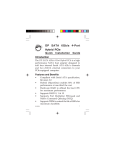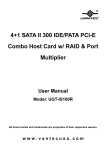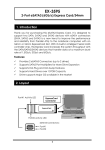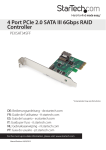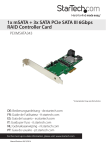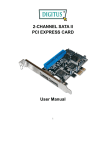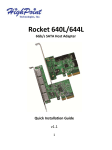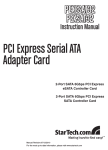Download Siig SC-SA0S11-S1
Transcript
DP SATA 6Gb/s 2-Port Hybrid PCIe Quick Installation Guide Introduction The DP SATA 6Gb/s 2-Port Hybrid PCIe is a high performance SATA host adapter designed to add two internal Serial ATA 6Gb/s channels to your PCIe-equipped computer. Features and Benefits • • • • • • 04-0861A Compliant with Serial ATA specification, Revision 3.0 Hybrid (HyperDuo) enables 80% of SSD performance at one-third the cost Hardware RAID to offload the host CPU for maximum performance Supports RAID 0 & 1 Supports Port Multiplier FIS-based and Native Command Queuing (NCQ) Supports TRIM to extend the life of SSDs for maximum durability 1 System Requirements • • Desktop PC with an available PCIe slot Windows® 8 (32-/64-bit) / 7 (32-/64-bit) / Vista (32-/64-bit) / XP (32-/64-bit) /Server 2003 & 2008 (32/64-bit) / Server 2008 R2 Package Contents • • • • • • 2 DP SATA 6Gb/s 2-Port Hybrid PCIe Spare low profile bracket SATA data cable (2) SATA power cable Driver CD Quick installation guide Layout Port 1 Serial ATA Port 1 LED Connectors (optional)* Port 2 Port 2 LED (optional)* Figure 1: Layout * Note: Connect the hard disk drive activity LED of the system case to the pins horizontally. This connection is optional. 3 Hardware Installation For Low profile systems, install the spare low profile bracket now. General instructions for installing the card are provided below. Since the design of computer cases and motherboards vary, refer to your computer's reference manual for further information, if needed. Static Electricity Discharge may permanently damage your system. Discharge any static electricity build up in your body by touching your computer case for a few seconds. Avoid any contact with internal parts and handle cards only by their external edges. 1. 2. 3. 4. 4 Turn OFF the power to your computer and any other connected peripheral devices. Unplug the power cord from the back of the computer. Remove your computer cover. Remove the slot bracket cover from an available PCI Express slot. 5. 6. To install the card, carefully align the card's bus connector with the selected PCI Express slot on the motherboard. Push the board down firmly, but gently, until it is well seated. Replace the slot bracket holding screw to secure the card. Device Connection The DP SATA 6Gb/s 2-Port Hybrid PCIe is a two channel Serial ATA III controller that supports up to two Serial ATA hard disk drives. 1. Install your hard disk drive(s) in the chassis. 2. Connect the Serial ATA hard disk drive to the system power supply. Note: For hard drives with both SATA power connector and legacy 4-pin connector, use either the SATA power connector or the legacy 4-pin power connector. Using both power connectors may damage the hard drive. 5 3. Connect one end of the Serial ATA cable to the hard disk drive. Serial ATA Power Figure 2. SATA hard disk drive connections 4. 5. Attach the other end of the Serial ATA data cable to the Serial ATA connector on the DP SATA 6Gb/s 2-Port Hybrid PCIe. Follow the same instructions to connect the second hard drive, if needed. Device connection is now complete. RAID Arrays This controller can be configure for hardware RAID 0 and 1, if needed. If you don't need RAID 0 or 1, please proceed to Driver Installation in page 10. RAID Arrays are setup in the DP SATA 6Gb/s 2-Port Hybrid PCIe BIOS. Note: After RAID 0 or RAID 1 setup, you can rename the VD Name. This is optional. 6 RAID 0 (Striping) This RAID array to be used on New/Blank hard drives. Striping will destroy existing data on the hard drive. 1. As the BIOS boots press Ctrl+M when prompted to enter the RAID BIOS. 2. At the next screen select HBA 0: Marvell 0, press Enter. Select Configuration Wizard, then press Enter. 3. Use Up or Down arrow key to choose hard drive. Press Spacebar to select the hard drive. Perform the same procedure with the other hard drive. Once both hard drives are selected, press Enter. 4. Select RAID Level or HyperDuo, press Enter. Select RAID 0, then press Enter. 5. 6. Select Next, press Enter. When asked Do you want to create this virtual disk? press Y to select Yes. Press F10 to exit the BIOS. When asked Do you want to exit from Marvell BIOS Setup? press Y to exit and reboot. 7 RAID 1 (Mirror) 1. 2. 3. 4. 5. 6. 8 As the BIOS boots press Ctrl+M when prompted to enter the RAID BIOS. At the next screen select HBA 0: Marvell 0, press Enter. Select Configuration Wizard, then press Enter. Use Up or Down arrow key to choose hard drive. Press Spacebar to select the hard drive. Perform the same procedure with the other hard drive. Once both hard drives are selected press Enter. Select RAID Level or HyperDuo, press Enter. Select RAID1, then press Enter. Select Next, press Enter. When asked Do you want to create this virtual disk? press Y to select Yes. Press F10 to exit the BIOS. When asked Do you want to exit from Marvell BIOS Setup?press Y to exit and reboot. Rebuilding a Failed Mirror Set When a failure to one member occurs, you will be notified by the RAID BIOS during boot up. The steps below will guide you in rebuilding a failed mirror set. 1. Replace the failed drive with one of equal or greater capacity, then power on the computer. 2. As the BIOS boots press Ctrl+M when prompted to enter the RAID BIOS. 3. Select New_VD, press Enter. Select Rebuild then press Enter. 4. Select new hard drive under Free Physical Disks. 5. Press Spacebar to select hard drive, then press Enter. Deleting RAID Arrays Deleting RAID arrays will destroy all data on the disk. Please backup your data before preceeding. 1. As the BIOS boots press Ctrl+M when prompted to enter the RAID BIOS. 9 2. 3. 4. 5. Select New_VD, press Enter. Select Delete then press Enter. When asked Do you want to delete this virtual disk? press Y to select Yes. When asked Do you want to delete MBR from this virtual disk? press Y to select Yes. Press F10 to exit the BIOS. When asked Do you want to exit from Marvell BIOS setup? press Y to exit and reboot. Driver Installation This section provides information on how to install the drivers. Windows 8 (32-/64-bit) / Windows 7 (32-/ 64-bit) / Server 2008 R2 For New Installation 1. Setup the RAID array prior to Windows installation. If RAID is not required, go directly to step 2. 2. Follow Windows installation procedure. 10 3. 4. 5. 6. 7. 8. At the Windows desktop, insert the driver CD, close the CD autoplay window if prompted. Click Windows key and R, type D:\Drivers\drvSetup.exe, click OK. (Change D: to match your CD-/DVD- ROM drive letter) At the User Account Control, click Yes. Skip this step if not prompted. At Magni driver Setup, click Next, and click Next again. Change the Destination Folder if you want to change it; otherwise, click Install. Click Finish, then restart the computer to complete the installation. For Existing Installation 1. Setup the RAID array prior to driver installation and boot up to Windows. If RAID is not required, boot up to Windows and go directly to step 2. 2. Insert the driver CD, close the CD autoplay window if prompted. 11 3. 4. 5. 6. 7. Click Windows key and R, type D:\Drivers\drvSetup.exe, click OK. (Change D: to match your CD-/DVD- ROM drive letter) At the User Account Control, click Yes. Skip this step if not prompted. At Magni driver Setup, click Next, and click Next again. Change the Destination Folder if you want to change it; otherwise, click Install. Click Finish, then restart the computer. Windows Vista (32-/64-bit) / Server 2008 (32-/64-bit) For A New Installation 1. Setup the RAID array prior to Windows installation. 2. Follow Windows installation procedure. 3. After booting up the Windows, click Cancel at the Found New Hardware window. 4. Insert the driver CD, close the CD autoplay window if prompted. 12 5. 6. 7. 8. 9. Click Start, at the Start Search, type D:\Drivers\drvSetup.exe, click Enter. (Change D: to match your CD-/DVD- ROM drive letter) At the User Account Control, click Continue. Skip this step if not prompted. At Magni driver Setup, click Next, and click Next again. Change the Destination Folder if you want to change it; otherwise, click Install. Click Finish, then restart the computer. For Existing Installation 1. Setup the RAID array prior to driver installation and boot up to Windows. If RAID is not required, go directly to step 2. 2. Click Cancel at the Found New Hardware window. 3. Insert the driver CD, close the CD autoplay window if prompted. 4. Click Start, at the Start Search, type D:\Drivers\drvSetup.exe, click Enter. (Change D: to match your CD-/DVD- ROM drive letter) 13 5. 6. 7. 8. At the User Account Control, click Continue. Skip this step if not prompted. At Magni driver Setup, click Next, and click Next again. Change the Destination Folder if you want to change it; otherwise, click Install. Click Finish, then restart the computer. Windows XP (32-/64-bit) / Server 2003 (32-/ 64-bit) For A New Installation (32-bit) A new installation requires a floppy disk for the driver installation. To make this floppy disk, copy the contents of the Floppy32 folder which is under Drivers/ miniport folder on the driver CD onto a blank floppy disk, then follow the directions below. 1. Setup the RAID array prior to Windows installation. If RAID is not required, go directly to step 2. 2. Follow Windows installation procedure. 3. At the Windows Setup screen, press F6 to install the RAID driver. 14 4. 5. 6. 7. When prompted, press S to specify the location of the driver. Insert the floppy disk, then press Enter. Select Marvell shared library (install first), then press Enter. Press S to specify the location of the driver. Select Marvell 91xx SATA controller 32bit Driver, then press Enter. Note: Do not remove the floppy diskette from the floppy drive. You need to install the driver again during the installation. 8. 9. 10. Press Enter again to finish the driver installation, then follow the on-screen instructions to complete your Windows installation. After the installation, insert the driver CD. Close the CD autoplay window if prompted. Click Start , Run, type D:\Drivers\ drvSetup.exe, click OK. (Change D: to match your CD-/DVD- ROM drive letter) 15 11. 12. 13. At Magni driver Setup, click Next, and click Next again. Change the Destination Folder if you want to change it; otherwise, click Install. Click Finish, then restart the computer to complete the installation. For A New Installation (64-bit) A new installation requires a floppy disk for the driver installation. To make this floppy disk, copy the contents of the Floppy64 folder which is under Drivers/ miniport on the driver CD, onto a blank floppy disk, then follow the directions below. 1. Setup the RAID array prior to Windows installation. If RAID is not required, go directly to step 2. 2. Follow Windows installation procedure. 3. At the Windows Setup screen, press F6 to install the RAID driver. 4. When prompted, press S to specify the location of the driver. 5. Insert the floppy disk, then press Enter. 16 6. 7. Select Marvell shared library (install first), then press Enter. Press S to specify the location of the driver. Select Marvell 91xx SATA controller 64bit Driver, then press Enter. Note: Do not remove the floppy diskette from the floppy drive. You need to install the driver again during the installation. 8. 9. 10. 11. 12. 13. Press Enter again to finish the driver installation, then follow the on-screen instructions to complete your Windows installation. After the installation, insert the driver CD. Close the CD autoplay window if prompted. Click Start , Run, type D:\Drivers\ drvSetup.exe, click OK. (Change D: to match your CD-/DVD- ROM drive letter) At Magni driver Setup, click Next, and click Next again. Change the Destination Folder if you want to change it, otherwise, click Install. Click Finish, then restart Windows. 17 For Existing Installation 1. Setup the RAID array prior to driver installation and boot up to Windows. If RAID is not required, boot up to Windows and go directly to step 2. 2. Click Cancel at the Found New Hardware. 3. Insert the driver CD, close the CD autoplay window if prompted. 4. Click Start , Run, type D:\Drivers\ drvSetup.exe, click OK. (Change D: to match your CD-/DVD- ROM drive letter) 5. At Magni driver Setup, click Next, and click Next again. 6. Change the Destination Folder if you want to change it; otherwise, click Install. 7. Click Finish, then restart Windows. To Verify Windows Installation 1. 18 Use Device Manager to verify installation. For Windows 8 / 7 / XP / Server 2003: Right click Computer or My Computer, click Manage, then click Device Manager. 2. For Windows Vista: Right click Computer, click Manage, click Continue. Click Device Manager. For Windows Server 2008 / 2008 R2: Right click Computer, click Manage. Double click Diagnostics, click Device Manager. Double click Storage controllers or SCSI and RAID controllers, Marvell 91xx SATA 6G Controller should be displayed. Marvell Storage Utility Follow the instuctions below to install the Marvell Storage Utility GUI. 1. Double click MSUSetup in the GUI folder on your software CD. 2. At the User Account Control, click Yes or Continue. Skip this step if not prompted. 3. At Welcome to the Marvell MSU V4 Setup Wizard, click Next. 4. At License Agreement, select I accept the terms of the License Agreement, click Next. 5. Click Next again. 19 6. 7. 8. 10. 11. Change the Destination folder if you want to change it; otherwise, click Install. Click Allow access at the Windows Security Alert. Skip this step if not prompted. At the Completing the Marvell MSU V4 Setup Wizard, click Finish. After successful installation, the MSU GUI is ready for use. Enable the software by double click on it. Type in the Username and Password to log in. Username and Password are your Windows user name and password. If you have a user name but no password, please leave the password field blank. Figure 3 20 12. After log in, you can access to the MSU user interface for further VD management. See Figure 4. Refer to your UserGuide on the software CD for more details. Figure 4 21 Blank Page 22 Technical Support and Warranty QUESTIONS? SIIG’ s Online Support has answers! Simply visit our web site at www.siig.com and click Support. Our online support database is updated daily with new drivers and solutions. Answers to your questions could be just a few clicks away. You can also submit questions online and a technical support analyst will promptly respond. SIIG offers a 5-year manufacturer warranty with this product. This warranty covers the original purchaser and guarantees the product to be free of any defects in materials or workmanship for five (5) years from the date of purchase of the product. SIIG will, at our discretion, repair or replace (with an identical product or product having similar features and functionality) the product if defective in materials or workmanship. This warranty gives you specific legal rights, and you may also have other rights which vary from state to state. Please see our web site for more warranty details. If you encounter any problems with this product, please follow the procedures below. A) If it is within the store's return policy period, please return the product to the store where you purchased from. B) If your purchase has passed the store's return policy period, please follow the steps below to have the product repaired or replaced. Step 1: Submit your RMA request. Go to www.siig.com, click Support, then REQUEST A PRODUCT REPLACEMENT to submit a request to SIIG RMA or fax a request to 510-657-5962. Your RMA request will be processed, if the product is determined to be defective, an RMA number will be issued. Step 2: After obtaining an RMA number, ship the product. • Properly pack the product for shipping. All accessories that came with the original package must be included. • Clearly write your RMA number on the top of the returned package. SIIG will refuse to accept any shipping package, and will not be responsible for a product returned without an RMA number posted on the outside of the shipping carton. • You are responsible for the cost of shipping to SIIG. Ship the product to the following address: SIIG, Inc. 6078 Stewart Avenue Fremont, CA 94538-3152, USA RMA #: • SIIG will ship the repaired or replaced product via Ground in the U.S. and International Economy outside of the U.S. at no cost to the customer. 23 About SIIG, Inc. Founded in 1985, SIIG, Inc. is a leading manufacturer of IT connectivity solutions (including Serial ATA and Ultra ATA Controllers, FireWire, USB, and legacy I/O adapters) that bridge the connection between Desktop/ Notebook systems and external peripherals. SIIG continues to grow by adding A/V and Digital Signage connectivity solutions to our extensive portfolio. SIIG products offer comprehensive user manuals, many user-friendly features, and are backed by an extensive manufacturer warranty. High quality control standards are evident by the overall ease of installation and compatibility of our products, as well as one of the lowest defective return rates in the industry. SIIG products can be found in computer retail stores, mail order catalogs, through major distributors, system integrators, and VARs in the Americas and the UK, and through e-commerce sites. PRODUCT NAME DP SATA 6Gb/s 2-Port Hybrid PCIe FCC RULES: TESTED TO COMPLY WITH FCC PART 15, CLASS B OPERATING ENVIRONMENT: FOR HOME OR OFFICE USE FCC COMPLIANCE STATEMENT: This device complies with part 15 of the FCC Rules. Operation is subject to the following two conditions: (1) This device may not cause harmful interference, and (2) this device must accept any interference received, including interference that may cause undesired operation. THE PARTY RESPONSIBLE FOR PRODUCT COMPLIANCE SIIG, Inc. 6078 Stewart Avenue Fremont, CA 94538-3152, USA Phone: 510-657-8688 DP SATA 6Gb/s 2-Port Hybrid PCIe is a trademark of SIIG, Inc. SIIG and the SIIG logo are registered trademarks of SIIG, Inc. Microsoft and Windows are registered trademarks of Microsoft Corporation. All other names used in this publication are for identification only and may be trademarks of their respective owners. February, 2013 Copyright © 2013 by SIIG, Inc. All rights reserved.
























